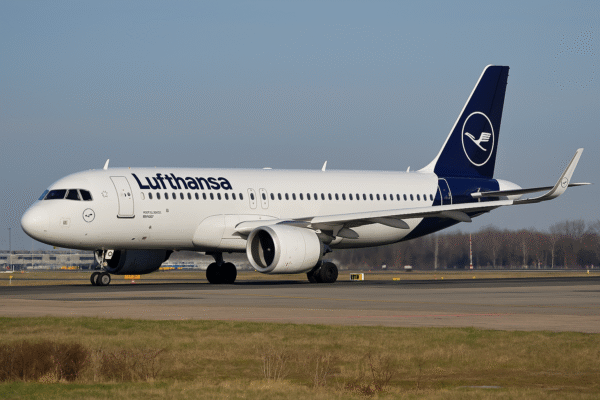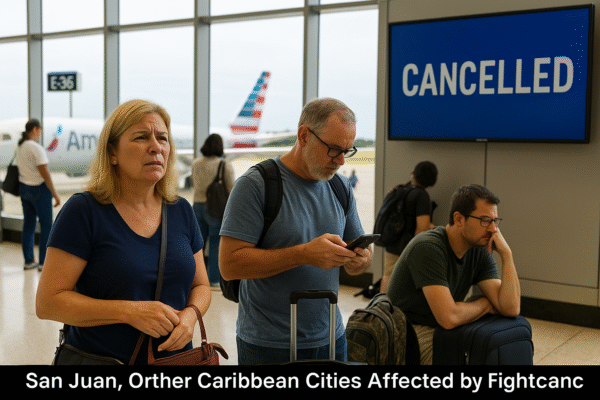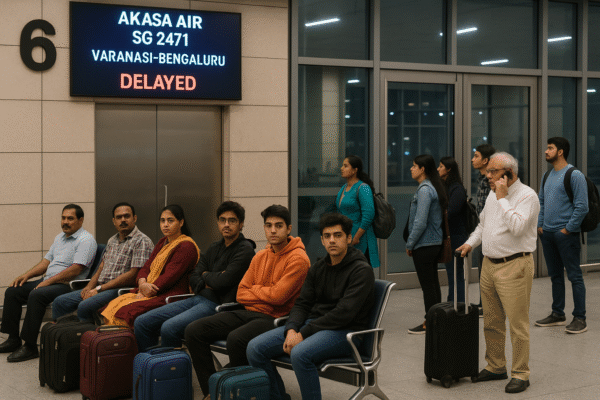Varanasi, one of India’s most prominent spiritual and cultural destinations, witnessed unexpected travel disruption when an Akasa Airlines flight bound for Bengaluru was unable to take off due to technical issues. The incident left 143 passengers stranded overnight at Lal Bahadur Shastri International Airport, causing frustration and discomfort among travelers. For many, the experience overshadowed the excitement of their journey, raising broader concerns about the reliability of domestic air travel in India.
Passengers initially waited with the hope that the situation would be resolved within a short span of time. However, as the hours stretched late into the night, it became evident that the flight would not depart until the following morning. This created a ripple of inconvenience for families, business travelers, and tourists alike, particularly in a city where many passengers rely on connecting flights or pre-booked itineraries.
The Broader Issue of Domestic Flight Disruptions
The incident in Varanasi is not an isolated case. Flight delays and cancellations have become a recurring challenge for travelers in India, often caused by technical malfunctions, weather-related disruptions, or logistical hurdles. With domestic aviation witnessing a sharp rise in demand over the past few years, airports across the country are under increasing strain.
Lal Bahadur Shastri International Airport, while strategically important for northern India, is still evolving in terms of infrastructure to handle large volumes of passengers. A sudden flight disruption places immense pressure on facilities that are already stretched thin. Such incidents highlight the urgent need for better preparedness and robust backup systems to manage the growing demands of modern air travel.
Akasa Airlines’ Response to the Situation
To its credit, Akasa Airlines took several steps to assist stranded passengers. The airline provided refreshments and assured compensation to those affected. While such measures are necessary to maintain passenger trust, they did little to ease the immediate discomfort caused by the long, uncertain wait.
For many travelers, the issue was not only the delay itself but also the lack of timely communication. Passengers reported feeling left in the dark, with sporadic updates from staff that often failed to provide clarity. This lack of coherent information amplified anxiety and frustration. Effective crisis management in aviation requires not only technical solutions but also strong communication channels that keep passengers informed every step of the way.
Strain on Airport Facilities
The delay exposed the limitations of Varanasi’s airport facilities. Seating arrangements, rest spaces, and amenities were insufficient for the large number of stranded passengers. While some travelers were able to find accommodation in nearby hotels, many others were left to wait inside the terminal overnight.
With Varanasi emerging as a key gateway for spiritual tourism, particularly for international visitors exploring the Ganges and heritage sites, the airport must evolve to offer a seamless experience even during disruptions. The lack of adequate overnight facilities or structured support for stranded passengers reflects a gap in preparedness that must be addressed as passenger numbers continue to rise.
Growing Demand for Better Customer Service in Indian Aviation
The incident also reignited discussions around customer service standards in India’s aviation industry. As air travel becomes the preferred mode of transportation for millions, travelers now expect airlines to go beyond the basics of compensation and refreshments. Real-time communication, better staff training, and proactive management of delays have become critical factors in shaping passenger satisfaction.
Reports from Varanasi indicated that many passengers were confused about rescheduling options and worried about missing onward connections. This shows the importance of airlines investing in customer service technology and personnel who can respond effectively during crises. With India projected to become one of the largest aviation markets globally, enhancing the passenger experience is no longer optional—it is essential for growth and credibility.
Lessons for the Future of Domestic Travel
As stranded passengers eventually boarded rescheduled flights, the incident left behind an important lesson for both airlines and airport authorities. Reliability and efficiency are the cornerstones of a thriving aviation industry. Technical issues may not always be avoidable, but the way they are handled determines passenger trust.
For airports like Varanasi, which serve as both domestic hubs and international gateways, strengthening infrastructure, improving passenger amenities, and adopting modern communication systems are urgent priorities. For airlines, the focus must extend beyond operational fixes to include customer-centric practices that reassure travelers in moments of disruption.
Tourism and Traveler Confidence
Varanasi, a city that draws millions of visitors each year for its unique blend of spirituality, heritage, and culture, cannot afford disruptions of this scale to tarnish its reputation as a travel-friendly destination. Flight delays not only affect immediate passengers but also ripple into the tourism economy, disrupting hotel stays, tours, and business schedules.
India’s tourism industry, which heavily depends on smooth connectivity, needs airlines and airports to collaborate in building resilience against such setbacks. Tourists, both domestic and international, increasingly weigh their travel experiences holistically—from booking tickets to stepping out of the arrival terminal. Every disruption, therefore, becomes a test of the country’s readiness to support its rapidly expanding tourism sector.
Moving Ahead with Optimism
While the Akasa Airlines delay in Varanasi posed challenges, it also presented an opportunity for reflection and improvement. With India’s aviation market set to expand further, addressing these issues proactively will pave the way for a smoother travel experience in the future.
For now, passengers who endured the long night at Lal Bahadur Shastri International Airport have continued their journeys, carrying both the frustration of disruption and the hope that future travel will be more reliable.
For more travel news like this, keep reading Global Travel Wire


















